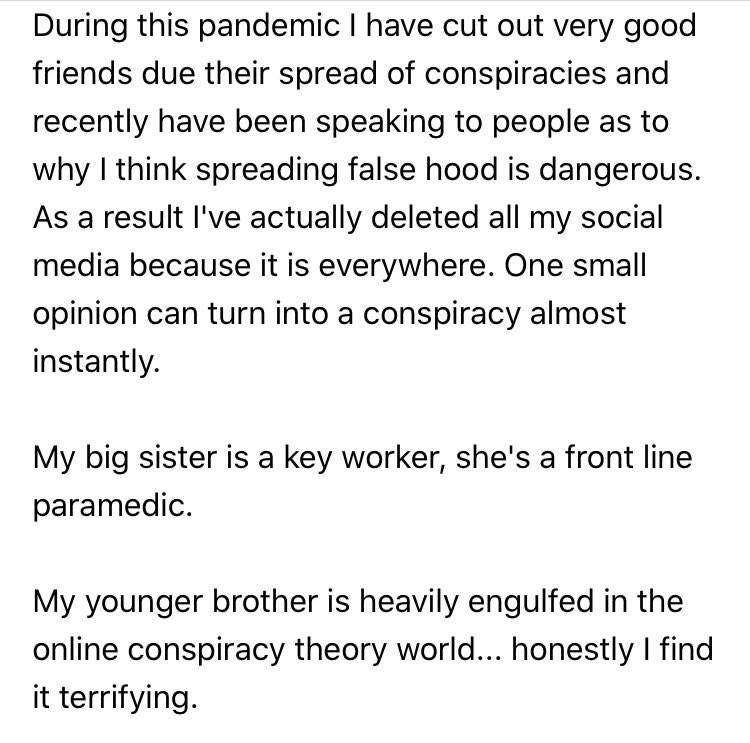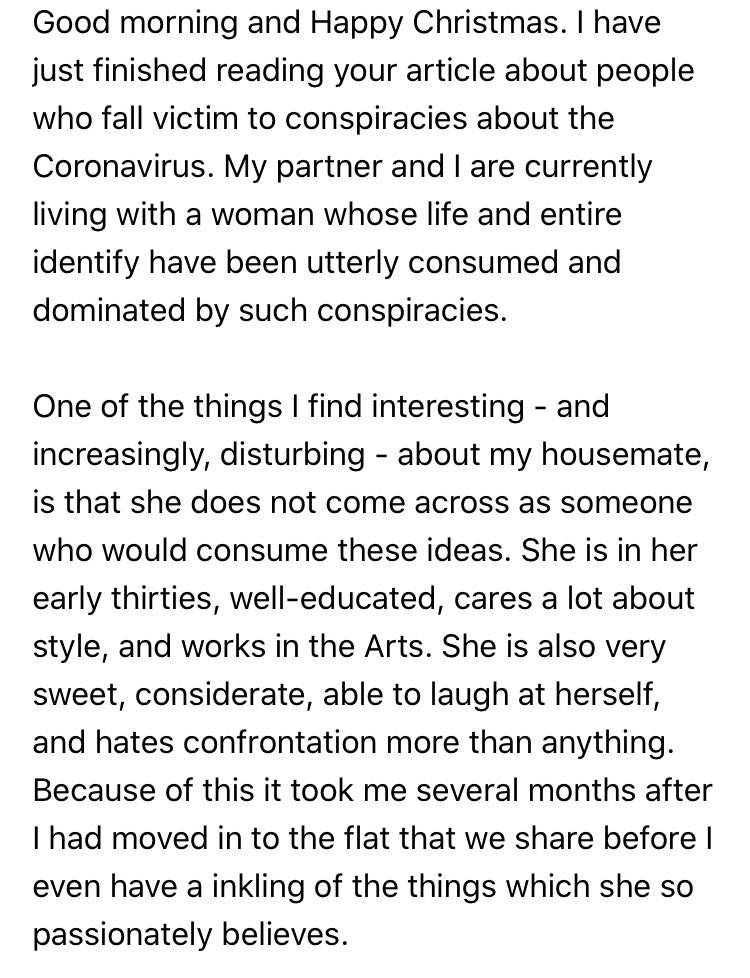NEW  Conspiracy theories ripped through the internet this year, destroying relationships and endangering lives - worlds apart from legitimate concerns.
Conspiracy theories ripped through the internet this year, destroying relationships and endangering lives - worlds apart from legitimate concerns.
Here I reflect on their casualties and my year reporting on the impact of viral disinformation. https://www.bbc.co.uk/news/blogs-trending-55355911
 Conspiracy theories ripped through the internet this year, destroying relationships and endangering lives - worlds apart from legitimate concerns.
Conspiracy theories ripped through the internet this year, destroying relationships and endangering lives - worlds apart from legitimate concerns.Here I reflect on their casualties and my year reporting on the impact of viral disinformation. https://www.bbc.co.uk/news/blogs-trending-55355911
If the BBC didn’t have a specialist disinformation reporter and team of experts, these stories could be left untold.
Tune into to our @BBCtrending special presented by me and top editor @mwendling - produced by the excellent @samjudah and @griffmedia https://www.bbc.co.uk/sounds/play/w3ct1d1z
https://www.bbc.co.uk/sounds/play/w3ct1d1z
Tune into to our @BBCtrending special presented by me and top editor @mwendling - produced by the excellent @samjudah and @griffmedia
 https://www.bbc.co.uk/sounds/play/w3ct1d1z
https://www.bbc.co.uk/sounds/play/w3ct1d1z
The flurry of online falsehoods about coronavirus began as soon as the pandemic hit.
Misleading pictures suggesting tanks were rolling down village streets and lists of false diagnostic tips were frantically forwarded on WhatsApp. https://www.bbc.com/news/blogs-trending-53640964
Misleading pictures suggesting tanks were rolling down village streets and lists of false diagnostic tips were frantically forwarded on WhatsApp. https://www.bbc.com/news/blogs-trending-53640964
As luck would have it, I had just begun my job reporting on the impact of online disinformation.
As the BBC’s specialist disinformation reporter, I investigate the real world consequences of viral conspiracies - and the anatomy of how they spread. https://www.bbc.co.uk/news/blogs-trending-54738471
As the BBC’s specialist disinformation reporter, I investigate the real world consequences of viral conspiracies - and the anatomy of how they spread. https://www.bbc.co.uk/news/blogs-trending-54738471
With the help of a BBC team of experts - in this case my brilliant colleague @O_Rob1nson - I got to work looking into the spread of one really viral post.
Coronavirus: How bad information goes viral https://www.bbc.co.uk/news/blogs-trending-51931394
Coronavirus: How bad information goes viral https://www.bbc.co.uk/news/blogs-trending-51931394
The post seemed legitimate, because the info was attributed to a trusted source: a doctor or well-educated "uncle".
It hopped across Facebook, translated into a dozen languages.
But along with useful information, it listed false cures and phony diagnostic tests.
It hopped across Facebook, translated into a dozen languages.
But along with useful information, it listed false cures and phony diagnostic tests.
One of those most responsible for its online spread was 84-year Peter from Buckinghamshire.
He insisted he didn’t mean to spread bad info.
Have his online habits changed since he went super viral? Not a whole lot.
He tells me fact-checkers flagged his posts 4 times since.
He insisted he didn’t mean to spread bad info.
Have his online habits changed since he went super viral? Not a whole lot.
He tells me fact-checkers flagged his posts 4 times since.
Although some of the information in Peter’s viral post was wrong, it wasn't critically dangerous.
That's not always the case. With our team, I investigated numerous links around the world between misleading posts online and serious real world harm. https://www.bbc.co.uk/news/stories-52731624
That's not always the case. With our team, I investigated numerous links around the world between misleading posts online and serious real world harm. https://www.bbc.co.uk/news/stories-52731624
Brian's story stood out.
He's a 46-year old taxi driver from Florida who I first interviewed in May. Because of posts he had seen on Facebook, he believed a variety of false claims: that coronavirus was not real, not serious, or somehow linked to 5G technology.
He's a 46-year old taxi driver from Florida who I first interviewed in May. Because of posts he had seen on Facebook, he believed a variety of false claims: that coronavirus was not real, not serious, or somehow linked to 5G technology.
He didn't follow health guidance. Then Brian and his wife Erin fell seriously ill with Covid-19 and ended up in hospital.
As his wife remained in a critical condition, he regretted not trusting expert advice.
She later died. https://www.bbc.co.uk/news/world-us-canada-53892856
As his wife remained in a critical condition, he regretted not trusting expert advice.
She later died. https://www.bbc.co.uk/news/world-us-canada-53892856
I caught up with Brian at the end of what has, understandably, been a difficult year for him.
He's now being careful about following health advice - and keeping his online habits in check.
He's now being careful about following health advice - and keeping his online habits in check.
As we learned more about the virus, health "tips" were replaced by conspiracy theories - pushed by highly motivated individuals.
Newly-emerged influencers gained huge followings by denying the virus existed or suggesting the outbreak was planned and part of a sinister plot.
Newly-emerged influencers gained huge followings by denying the virus existed or suggesting the outbreak was planned and part of a sinister plot.
My inbox flooded with pleas for help from those with family members under their spell.
The most striking was from the son of a leader of Britain's conspiracy community. He feared for his mother's impact on public health - and their relationship. https://www.bbc.co.uk/news/uk-54669239
The most striking was from the son of a leader of Britain's conspiracy community. He feared for his mother's impact on public health - and their relationship. https://www.bbc.co.uk/news/uk-54669239
I've spoken to experts about how to repair relationships ravaged by cult-like online conspiracies.
"Infuse their thinking with counter arguments so the next time they approach a conspiracy theory in a different way,” says psychologist Jovan Byford. https://www.bbc.com/news/blogs-trending-55350794
"Infuse their thinking with counter arguments so the next time they approach a conspiracy theory in a different way,” says psychologist Jovan Byford. https://www.bbc.com/news/blogs-trending-55350794
The embers of 2020's blaze of bad viral info are still glowing as we head into 2021.
People around the world are starting to receive coronavirus vaccines - and conspiracy theories about this will be pushed in the months ahead.
Very different to concerns about side effects.
People around the world are starting to receive coronavirus vaccines - and conspiracy theories about this will be pushed in the months ahead.
Very different to concerns about side effects.
Just as the vaccine roll-out began, I investigated how the feet of a Texas woman named Patricia were used to fuel anti-vaccine propaganda online.
It boiled down to a misunderstanding about what might have caused an unexplained skin condition. https://www.bbc.co.uk/news/blogs-trending-55179300
It boiled down to a misunderstanding about what might have caused an unexplained skin condition. https://www.bbc.co.uk/news/blogs-trending-55179300
There is a huge difference between harmful, false conspiracy theories shared online and criticisms of government policy, legitimate opposition to lockdown and questions and concerns about the vaccine.
Sometimes the latter can make people more vulnerable to the former.
Sometimes the latter can make people more vulnerable to the former.
She joins a long list of casualties of viral conspiracies in 2020.
Online disinformation causes real world harm - and I’ll be reporting on its impact, especially around vaccines, as we head into 2021.
Listen https://bbc.in/2M92fmt
https://bbc.in/2M92fmt
Read https://bbc.in/2Kt2rN2
https://bbc.in/2Kt2rN2
Online disinformation causes real world harm - and I’ll be reporting on its impact, especially around vaccines, as we head into 2021.
Listen
 https://bbc.in/2M92fmt
https://bbc.in/2M92fmt Read
 https://bbc.in/2Kt2rN2
https://bbc.in/2Kt2rN2
When reporting on viral disinformation, I think it’s so important to humanise its consequences - to cover who it impacts, the casualties.
Empathy, understanding and investigating is most effective.
I talk about that in this article https://twitter.com/mariannaspring/status/1339852856606810112
https://twitter.com/mariannaspring/status/1339852856606810112
Empathy, understanding and investigating is most effective.
I talk about that in this article
 https://twitter.com/mariannaspring/status/1339852856606810112
https://twitter.com/mariannaspring/status/1339852856606810112
Surprisingly lots want to read about impact of viral conspiracies this year on Boxing Day!
Third most read on the site and over a million views.
Third most read on the site and over a million views.
I’ll highlight again that viral, false conspiracy theories - eg that the pandemic isn’t real and that a vaccine will be used to commit mass genocide - are totally different to concerns about impact of lockdown and criticism of government.
This is about facts not opinion.
This is about facts not opinion.
All of these reports featured across TV, radio and online this year - from News at Six and Ten to Newsround to World to Radio 4 and 5live.
Have a listen to this end of year special for @bbcworldservice where you can hear interviews with those impacted! https://www.bbc.co.uk/sounds/play/w3ct1d1z
Have a listen to this end of year special for @bbcworldservice where you can hear interviews with those impacted! https://www.bbc.co.uk/sounds/play/w3ct1d1z
This report focuses on the casualties of viral pandemic conspiracies.
But listen to the @bbcworldservice radio special for more on the impact of political disinformation online in the build up to and after the US election. https://www.bbc.com/news/blogs-trending-55009950
But listen to the @bbcworldservice radio special for more on the impact of political disinformation online in the build up to and after the US election. https://www.bbc.com/news/blogs-trending-55009950
These are just the casualties of viral disinformation that I have reported on and whose stories I’ve investigated.
I have received tens of emails from those who say this article hit home. Their families and friends have been impacted by conspiracy theories online this year.
I have received tens of emails from those who say this article hit home. Their families and friends have been impacted by conspiracy theories online this year.
Over two million read this report yesterday. Have a look if you missed it - or listen to the special.
I’m now switching off again for the next week! (Which I am very bad at) https://twitter.com/mariannaspring/status/1341099480276488203
I’m now switching off again for the next week! (Which I am very bad at) https://twitter.com/mariannaspring/status/1341099480276488203

 Read on Twitter
Read on Twitter








